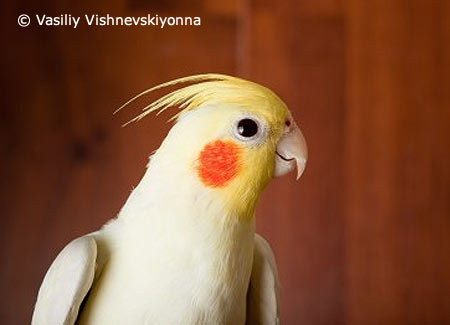Reasons Why Cockatiels Bite

Below are common reasons why a pet cockatiel may bite. Simply click on the biting topic below for more information. If you cannot determine why your cockatiel is biting with the information provided , please post your question on our parrot forum under the cockatiel section or head on over to our main cockatiel area.
- Reasons Why Cockatiels Bite
- Fearful Biting from a Cockatiel
- A Cockatiel Biting Out of Jealousy
- Cockatiel Territorial Biting
- Juvenile Biting in Cockatiels
- Reinforcement of Biting Unintentionally in Cockatiels
Fearful Biting from a Cockatiel
Most cockatiels will bite when they're scared and they believe their
life is in danger. It's that simple. Fearful biting is seen more in
untamed birds than in birds that have been tamed. Biting is a natural
instinct for birds and is a natural defense mechanism. In the wild, a
bird will often bite if it fears attack and then quickly will make its
escape. This behavior occurs mostly in untamed cockatiels that have been
removed from an aviary and are undergoing a taming process. In handfed
cockatiels, fearful biting is usually the result of the cockatiel being
placed into a new environment or when the bird is expected to interact
with a stranger it does not know.
Another reason that a cockatiel may bite is because it may fear an
object that it perceives as threatening or may not understand. For
example, a vacuum cleaner or ironing board can be scary objects to a pet
cockatiel. Most cockatiels hate these items and can quickly become
scared when placed near them. Smaller items such as new toys can also
push the bird to bite out of fear. For this reason, a new toy should
gradually be added to the bird’s collection to allow him to slowly
become accustomed to it. Again, it’s important to remember that all
birds react differently to situations; therefore, making it more
necessary for owners to be aware of their birds reaction when
introducing new objects to the cockatiel’s environment.
Other animals such as dogs, cats, or reptiles can also invoke a fearful
response that can lead to biting.
Solution: Fearful biting takes time to remedy. The best approach is
through positive reinforcement. If a new person wishes to hold the
cockatiel, the bird should be allowed time to adjust before being
handled. This can be accomplished by the person offering the cockatiel
treats to gradually coax him to step onto his finger. It may take time
at first for the cockatiel to comply, but eventually the cockatiel will
step up when given a treat. This method can be very effective. The owner
should practice this training technique with several people around;
whereby, the bird will eventually become oblivious to its surroundings.
It will begin associating a treat with this wanted behavior. Eventually
the cockatiel will become accustomed to strangers and will see this
behavior as natural.
If the cockatiel is scared of an object such as a new toy or an item
within the room, the owner should place many treats around the new
object. At first, the object should be placed across the room and far
away from the bird as this helps to gradually introduce the new item
without too much stress. The cockatiel will eventually see the treats
and will then begin to investigate. This helps to condition the
cockatiel and slowly introduce him to a new object. This should be a
rewarding experience for the bird. It may take hours, days, or even
weeks for the bird to totally accept the item. This is quite normal and
the cockatiel should be given time as every bird is different.
It is important to understand that cockatiels are neophobic. This simply
means they are scared of new objects that are unfamiliar to them. This
can be counteracted by continually exposing the cockatiel to new items
throughout its life then being rewarded for its efforts. Treats should
always be used and the bird should never be rushed to accept a new
object into its environment. Always let the cockatiel set the pace and
stop when the bird feels scared.
If positive reinforcement is used as a means to correct this behavior,
the bird will start to enjoy new people, objects, and environments. The
owner should turn this into a game and eventually the bird will look
forward to playing as it knows a treat is coming.




